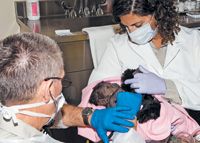Pets and Vets: Veterinarians at San Diego Zoo Safari Park perform C-section on gorilla
Veterinary staff is monitoring recovery of Imani, 18-year-old gorilla mother, after rare procedure.
Animal care staff at the San Diego Zoo Safari Park are caring for a newborn female gorilla after it was delivered by a rare emergency C-section, according to a zoo release.
The mother, 18-year-old Imani, showed signs of labor in the morning but by evening did not seem to be progressing, so veterinary staff decided to transport her to the park's Harter Veterinary Medical Center for the C-section.

San Diego Zoo Safari Park keeper Jennifer Minichino carefully holds a new baby gorilla while Jack Allen, DVM, completes his examination. (PHOTOS COURTESY OF SAN DIEGO ZOO SAFARI PARK)
The baby, which has not been named yet, was full term, weighed 4.6 pounds and was delivered by a team of San Diego Zoo global staff and outside consultants, including a veterinary surgeon and human neonatal specialists from University of California-San Diego Medical Center.
"In retrospect, the C-section was the right decision," says Nadine Lamberski, DVM, associate director of veterinary services at the safari park. "We think the health of the fetus would have been compromised if we delayed the surgery any longer."

The baby gorilla is being monitored closely since it showed signs of pneumonia, which the team says it acquired just prior to or immediately after birth. Imani is recovering from surgery in the gorilla bedroom area, according to the release. Once the baby is well, she will be reunited with her mother. This is Imani's first baby and the 17th to be born at the San Diego Zoo Safari Park.
State ROUNDUP
A look at the world of animal health
Colorado
A new bill has been approved in the Colorado Senate that will grant firefighters and other emergency medical service providers the authority to voluntarily provide some basic emergency care to domestic animals.
SB 39 would allow emergency medical providers to offer preveterinary emergency care to cats and dogs to the extent that they have received appropriate training and been authorized by their employer to do so. The bill requires employers to specify in their policies the circumstances under which care may be provided. Emergency responders may, under the "preveterinary care" designation, stabilize cats or dogs by using oxygen, fluids, medication or bandaging with the intent of enabling the dog or cat to be treated by a veterinarian.
Preveterinary emergency care does not include care provided in response to a call made solely for the purpose of tending to an injured dog or cat unless a person's life could be in danger while attempting to save the life of the animal.
While the bill allows for the care of animals, it does not mean an emergency medical provider is obligated to provide care for a cat or dog or to provide care to a dog or cat before treating a person.
Florida
After three weeks of treatment for burns sustained in an accident, a Parkland, Fla., dog returned home to finish her recovery. Ruby, an 8-year-old soft-coated wheaten terrier, suffered burns on more than 50 percent of her body when she accidentally caught fire, according to the Ft. Lauderdale Sun Sentinel.
Ruby's owner, Jesus "Jess" Olivas, and his wife had treated the dog with a flammable insecticide and then lit a barbecue starter to kill the bugs that were coming off the dog. Ruby caught fire when she got too close to the flame. Olivas picked up Ruby and jumped into his pool to extinguish the flames, which caused second- and third-degree burns to his forearms, neck and face.
Olivas' wife stayed behind with Ruby as Olivas was taken to the hospital. The couple worried that they would not be able to afford the care Ruby needed after receiving several expensive treatment estimates. But when Peter Krolikowski, DVM, heard about the incident, he and his staff treated the dog at no charge at Dr. Peter's Animal Hospital in Margate, Fla. Ruby was sent home with antibiotics and an ointment and will receive checkups every few days.
Iowa
An early morning fire at Animal Haven Veterinary Hospital in Hills, Iowa, killed two animals and destroyed the facility, reports the Iowa City Press-Citizen.
Firefighters responded to the blaze and had the fire under control in about 40 minutes, before it had a chance to spread to surrounding buildings, but not before the two animals—a dog and a cat—had perished.
"The fire investigator hasn't been through the building, but it appears to be a total loss with minor salvage," Mark Dennis, DVM, who opened the hospital in 1999, told the Press-Citizen. The official cause and damage total have not yet been determined, but it appeared that a faulty autoclave may have started the fire.
The animals were rescues without permanent homes and were the only animals in the hospital at the time. No humans were injured.
Dennis plans to stay in Hills, either rebuilding at that site or moving to another in town.
Ohio
Ronald C. Anders, a Celina, Ohio, veterinarian, has pleaded no contest in Celina Municipal Court to four "certificate of practice" violations for practicing acupuncture on humans, according to The Daily Standard of Celina, Ohio. The misdemeanor charges are related to separate incidents that occurred in 2009 and 2011.
The judge on the case ordered Anders to pay court costs and follow conditions already issued in a related 2011 civil case filed against him in Mercer County Common Pleas Court, in which he was "permanently prohibited and restrained from rendering diagnosis or performing medical procedures on human patients" in Ohio, according to the judgment.
In July 2011, the Ohio Veterinary Medical Licensing board warned of issuing a reprimand or suspending or revoking Anders' veterinary license after receiving a complaint that the had performed laser acupuncture therapy and administered injections of traumeel and cyanocobalamin to a human twice in May 2011, according to the Standard. A settlement was reached and Anders waived his right to appeal, paid a $2,000 fine and had his license suspended for several days. The board also settled another complaint in December 2012 related to treatment for a diabetic dog that fell "below the minimum standards of care."
Oklahoma
The Oklahoma State University Center for Veterinary Health Sciences plans to partner with the KOSU public radio station and the Kirkpatrick Foundation to broadcast Vet Med Moment, a radio program, according to a university release.
The short, weekly series will air Wednesday afternoons and Sunday mornings on several radio stations in the Stillwater and Tulsa area and on KOSU.org. The idea for the program arose after discussion among OSU officials and the Kirkpatrick Foundation, whose Safe and Humane initiative seeks to improve the lives of animals in Oklahoma and those who care for them.
Texas
A police sting carried out in conjunction with the Texas State Board of Veterinary Medical Examiners has led to the arrest of a pet store employee on charges that he practiced veterinary medicine without a license, according to a criminal complaint filed in the Pharr, Texas, Municipal Court.
Louis Alfredo Torres, an employee of Andy's Feed and Pet Store in Pharr, was arrested after preparing to administer an injection to a dog. According to the complaint, Torres said he could inject the dog with medication because it was sick. Instead he was arrested. Two months earlier, in January 2014, The Monitor (McAllen, Texas) reported that at least one pet owner had said his dog died after receiving vaccinations at the store, and a reporter took a picture of an employee about to administer a shot to a puppy. The store is licensed to sell certain vaccines over the counter, but because it does not have any licensed veterinarians on staff, employees are not qualified to administer them.
Torres was charged with violating veterinary regulations, a Class A misdemeanor that could result in up to one year in county jail and a $4,000 fine.
Podcast CE: A Surgeon’s Perspective on Current Trends for the Management of Osteoarthritis, Part 1
May 17th 2024David L. Dycus, DVM, MS, CCRP, DACVS joins Adam Christman, DVM, MBA, to discuss a proactive approach to the diagnosis of osteoarthritis and the best tools for general practice.
Listen